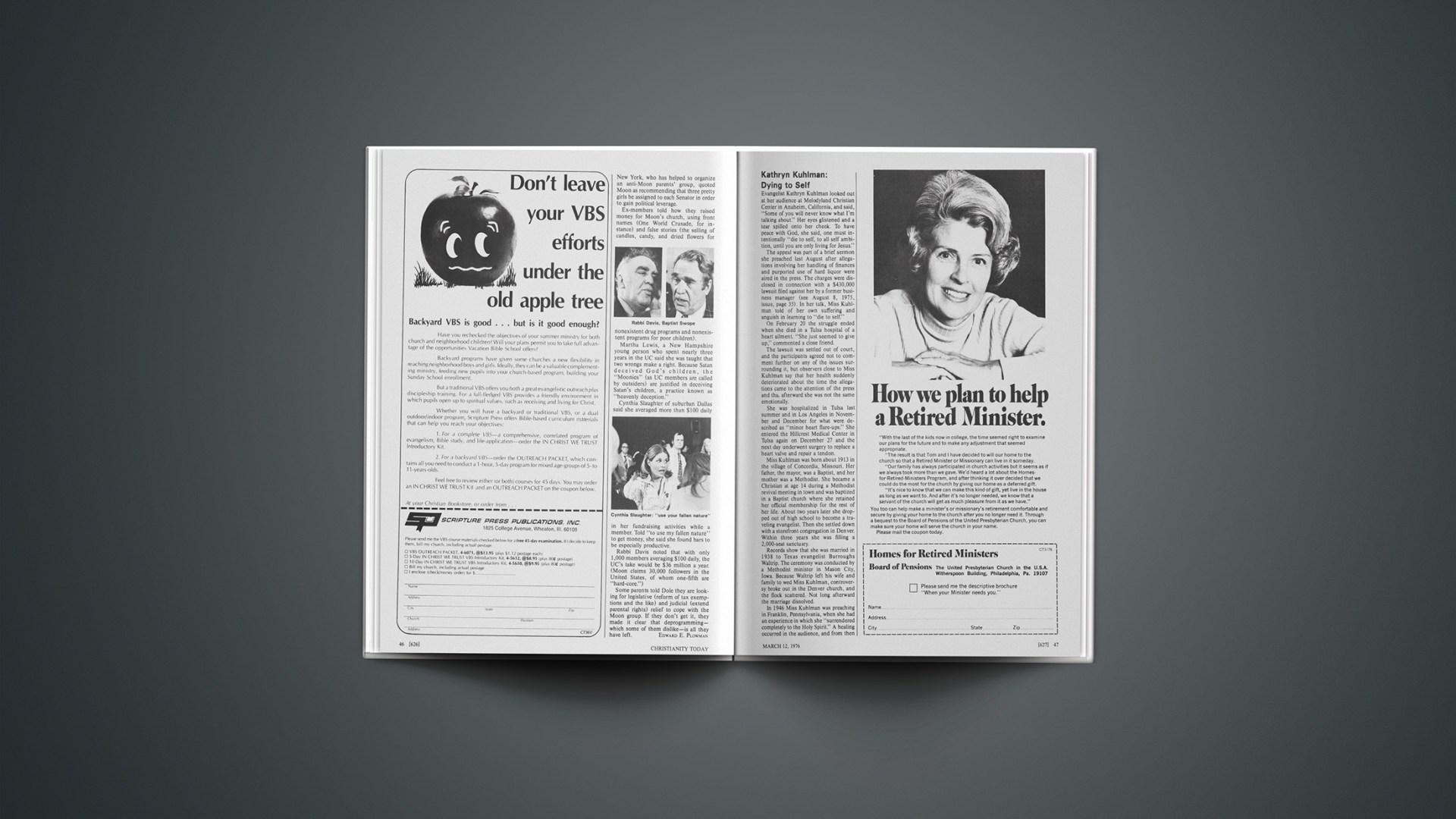Third in a Series
Despite a slowdown in initiative and a crumbling of unity in the last ten years, American evangelicalism has nonetheless undergone some noteworthy developments.
World Vision as an international humanitarian agency has gained remarkable favor as an outlet for the growing commitment to social effort combined with Christian witness.
Evangelically oriented seminaries (among them Dallas, Conservative Baptist, Fuller, Gordon-Conwell, Trinity, and Westminster) continue to show record enrollments. Inter-Varsity Christian Fellowship has somewhat come through its financial slump and has significantly expanded its publications programs; its triennial missionary conferences remain vigorous. Campus Crusade continues to enlarge its collegiate evangelistic ministry. The Institute for Advanced Christian Studies has provided over $100,000 to underwrite meritorious research by mature evangelical scholars.
Evangelical scholars continue to work on Bible translation, and the Living Bible paraphrase has gained readers in many circles where more traditional versions seemed linguistically remote. Wycliffe Bible Translators continues to extend the availability of Scripture in developing countries.
Dean M. Kelley observed in Why Conservative Churches are Growing, that despite the secular cultural pressures on American churches, significant growth is taking place particularly in the evangelical wing of Protestantism. Graham evangelistic crusades, while few and somewhat shorter than in earlier years and in some places under some attendance pressure, nonetheless still provide a focus for cooperative evangelism wherever they occur. A staggering number of counseling youths, and church-renewal programs have added depth to local evangelistic follow-up. The church-growth interest nurtured by Fuller Seminary’s Institute of Church Growth gave rise to related books and symposiums (cf. Donald McGavran, Understanding Church Growth, Eerdmans, 1969; McGavran, ed., The Eye of the Storm: The Great Debate in Mission, Word, 1972; Alan R. Tippett, ed., God, Man and Church Growth, Eerdmans, 1973).
The emergence of a literature by evangelicals that criticized the evangelical stance proved not to be an unmitigated liability. Occasional conservative books on social ethics appearing in the mid-sixties (e.g., David Moberg, Inasmuch: Christian Social Responsibility in the Twentieth Century, Eerdmans, 1965, and my own Aspects of Christian Social Ethics, Eerdmans, 1964) touched off a veritable tide of literature in the field. Sherwood Wirt’s The Social Conscience of the Evangelicals (Harper & Row, 1968) and a score of other works appeared in quick succession.
Younger church historians like James A. Hedstrom have assessed the appearance in the late sixties “of very honest and critical analysis of evangelicalism itself, by evangelicals” as a constructively significant sign. Hedstrom notes the call for change, for renewal and reform, that issued from black evangelicals, notably Tom Skinner (Words of Revolution, Zondervan, 1970, and How Black Is the Gospel?, Lippincott, 1970) and the protest of evangelicals against cultural conformity (Robert G. Clouse, Robert D. Linder, and Richard V. Pierard, eds., Protest and Politics: Christianity and Contemporary Affairs, Attic, 1968: Mark Hatfield, Conflict and Conscience, Word, 1971; Carl F. H. Henry, A Plea For Evangelical Demonstration, Baker, 1971; David O. Moberg, The Great Reversal: Evangelism Versus Social Concern, Lippincott, 1972). The growing interest in ethics was crowned finally by the cooperative evangelical effort Baker’s Dictionary of Christian Ethics (Baker, 1971). It led also to the forging by young evangelicals of a notable declaration of social concerns (cf. Ronald J. Sider, ed., The Chicago Declaration, Creation House, 1974). Unprecedented numbers of young evangelical students ventured into social service, law, political science, and other public fields as a Christian vocation.
The call for evangelical renewal precipitated and reflected significant divergencies. Nothing was more needed at the beginning of the seventies than incisive evangelical theological perspective and influential direction to maintain unity in the midst of creative debate. Francis Schaeffer’s L’Abri Fellowship in Switzerland reenlisted some runaway evangelicals for apologetic thrust on neglected cultural frontiers. But divergencies multiplied as comprehensive evangelical leadership was increasingly absent. At critical points—especially in the debate over scriptural authority and socio-political stance—the movement’s institutional spokesmen seemed to lack incisive power.
Billy Graham was the one voice that, in concert with CHRISTIANITY TODAY, could until five years ago have sparked a massive realignment of American evangelicals in a new and larger fellowship embracing the National Association of Evangelicals, many clergy and laymen in ecumenically oriented denominations, and even some loosely committed to the fundamentalist right. But such a move would have aroused denominational resistance to cooperative crusades. Graham’s late father-in-law, L. Nelson Bell, had notably opposed an evangelical realignment by Southern Presbyterians. The North American Presbyterian and Reformed Council is currently emerging as a framework to include the Christian Reformed Church, Orthodox Presbyterian Church, Reformed Presbyterian Church, Evangelical Synod, Reformed Presbyterian Church of North America. (The last named emerged primarily from the Presbyterian Church (Southern).) The time seems now to have passed in America for the emergence of a comprehensive evangelical para-ecumenical movement, if indeed that was ever a desirable development. The charismatic movement, welcomed or tolerated as a potentially potent force for uniting evangelicals across denominational barriers, is now increasingly strained by internal dispute over church authority, tradition, and mission, and by external denominational opposition and theological criticism; Southern Baptists have declared charismatic congregations to be divisive.
Meanwhile, CHRISTIANITY TODAY essayists have been drawn more largely from independent sources than from ecumenically oriented denominations; the fortnightly seems to be putting more and more distance between itself and the call to reexamine the evangelical sociopolitical stance while tightening a commitment to biblical inerrancy as the determinant of evangelical authenticity.
CARL F. H. HENRY










